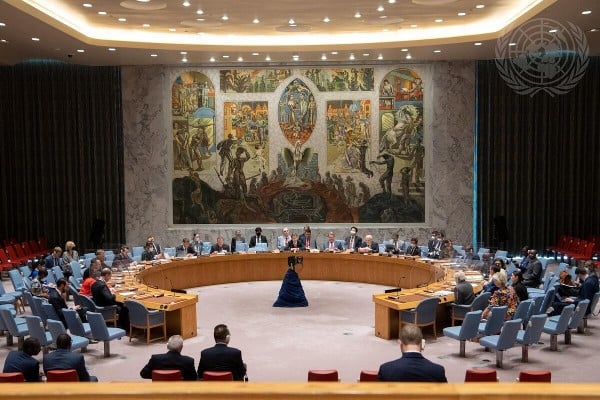Hamas released a statement welcoming the adoption of the resolution and stating it was ready to work with mediators in indirect negotiations with Israel to implement it.
By Mike Wagenheim, JNS
The United Nations Security Council on Monday adopted a U.S.-drafted resolution aimed at reaching a three-phase ceasefire deal to end the Israel-Hamas war in the Gaza Strip.
The resolution was passed by 14 of the 15 permanent Security Council members, with Russia abstaining. Moscow claimed that the parameters of the deal the resolution endorses had not been sufficiently clarified.
Noting that Israel has accepted the ceasefire proposal, the resolution calls for Hamas to do the same, and for both slides to “implement its terms without delay and without condition.”
Phase one of the proposed ceasefire deal includes “an immediate, full and complete ceasefire” coupled with the release of an unspecified number of hostages—both living and dead—in exchange for the release of an unspecified number of Palestinian security prisoners, the withdrawal of Israeli forces from “populated areas” of Gaza, the return of Gaza civilians to their homes throughout the Strip and the scaling up of aid delivery.
Phase two, which would be negotiated between the parties during the first phase, comprises “a permanent end to hostilities” in exchange for the release of the remaining hostages and full withdrawal of the Israel Defense Forces from Gaza.
According to the proposal, should negotiations toward phase two take longer than six weeks, the ceasefire will continue for as long as negotiations are ongoing.
The wording of the resolution calls into question whether Israel would retain operational freedom in Gaza to fully remove Hamas from power, though it “stresses the importance” of the Palestinian Authority returning to power in Gaza.
The Israeli government rejects both P.A. governance of the Strip and leaving Hamas in power.
Phase three would involve the release of the remaining dead hostages and a long-range Gazan reconstruction plan.
The question of how long the phase-one ceasefire is expected to hold should Israel feel it is being strung along in bad faith negotiations was a major sticking point in discussions, and has been left unanswered by Biden administration officials.
Hamas released a statement welcoming the adoption of the resolution and stating it was ready to work with mediators in indirect negotiations with Israel to implement it.
Curiously, Gilad Erdan, Israel’s ambassador to the United Nations, did not address the Security Council as planned, even though he was present in the council chamber for part of the meeting.
Instead, senior Israeli diplomat Reut Shapir Ben Naftaly told the council that Israel’s war aims have been “very clear” from the start: “To bring all our hostages back home and to dismantle Hamas’ capabilities…and ensure that Gaza does not pose a threat to Israel in the future.”
When these goals are met, the war will end, she said. “This also means that Israel will not engage in meaningless and endless negotiations, which can be exploited by Hamas as a means to stall for time,” she added.
Israel’s U.N. mission would not comment regarding why Erdan did not address the meeting. Erdan had voiced opposition to his U.S. counterpart, Linda Thomas-Greenfield, regarding an earlier draft of the resolution last week.
That text was amended, removing mention of “buffer zones” in the section rejecting territorial changes in Gaza.
The IDF has been creating buffer zones along the Israel-Gaza border to provide an extra layer of security, with plans to expand them.
The amendment appears to have been a direct concession to Israel, despite stated U.S. opposition to the zones’ creation.
Thomas-Greenfield assured the council on Monday that Israel had accepted the ceasefire deal, placing the onus on Hamas to reciprocate.
“The United States will help ensure that Israel lives up to its obligations as well, assuming Hamas accepts the deal,” said Thomas-Greenfield. “The fighting could stop today, if Hamas would do the same.”
Vasily Nebenzya, Russia’s U.N. envoy, said it was not clear what Israel had actually committed to.
“Hamas is called upon to accept this so-called deal, but still there is no…clarity regarding official agreement from Israel,” said Nebenzia. ”Given the many statements from Israel on the extension of the war until Hamas is completely defeated…what specifically has Israel agreed to?”
However, despite the Council “giving a carte blanche and signing up to this plan and with details that they don’t have,” Nebenzia said Russia had not used its veto to kill the resolution because it was supported by the Arab world.
The Security Council adopted a resolution on March 25 demanding a humanitarian ceasefire during the Ramadan holiday, with the U.S. controversially abstaining.
That resolution demanded “an immediate ceasefire for the month of Ramadan respected by all parties leading to a lasting ceasefire and also demands the immediate and conditional release of all hostages.”
However, it did not explicitly link the two demands.





